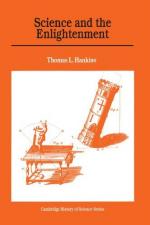
|
| Name: _________________________ | Period: ___________________ |
This quiz consists of 5 multiple choice and 5 short answer questions through Chapter 3, Experimental Physics.
Multiple Choice Questions
1. Madame du Chatelet supported the Leibnizian theory of ________ because it gave a better account of free will.
(a) Christianity.
(b) Mechanics.
(c) Religion.
(d) Physics.
2. Throughout the Enlightenment, reason was usually extolled in the same breath with ________, the other key word of the Enlightenment.
(a) Science.
(b) Nature.
(c) Religion.
(d) Nuture.
3. Descartes's "quantity of motion" is equivalent to our modern principle of the conservation of ________.
(a) Hermeneutics.
(b) Momentum.
(c) Impression.
(d) Formalism.
4. In Chapter 3, who proposed a single static electrical "atmosphere" that attracted and repelled by pressure rather than by the impact of an electrical wind?
(a) Desagulier.
(b) Musschenbroek.
(c) Newton.
(d) Franklin.
5. The narrator reveals that vis viva was a measure of ________ to conserve his creation while "action" was a measure of his efficiency.
(a) God's demeanor.
(b) Man's desire.
(c) Man's passion.
(d) God's desire.
Short Answer Questions
1. Of all the subtle fluids conceived of during the Enlightenment, the ________ was the one that caused the most excitement and attracted the most researchers.
2. In 1769, ________, a student of Joseph Black's at Glasgow, measured the repulsion between charges with an apparatus that balanced the electrical repulsion against gravitational attraction.
3. Which German metaphysician, when asked in 1785 if he believed he lived in an enlightened age, answered, "No, we are living in an age of enlightenment."
4. The concept of a ________ was a necessary step in the process of quantification, according to the narrator in Chapter 3.
5. All of the following English philosophers had shown convincingly that knowledge about the physical world could not be obtained from first principles without resort to experiment except for whom?
|
This section contains 272 words (approx. 1 page at 300 words per page) |

|




